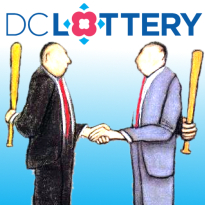 On Thursday, the District of Columbia’s Committee on Finance and Revenue held yet another hearing on the DC Lottery’s first-in-the-nation plans to launch online gambling within the District. This latest hearing was the work of DC Council member Jack Evans, who chairs the committee that’s considering a bill introduced by Council member Tommy Wells to repeal DC’s gambling legislation.
On Thursday, the District of Columbia’s Committee on Finance and Revenue held yet another hearing on the DC Lottery’s first-in-the-nation plans to launch online gambling within the District. This latest hearing was the work of DC Council member Jack Evans, who chairs the committee that’s considering a bill introduced by Council member Tommy Wells to repeal DC’s gambling legislation.
Those Council members who have spoken out against the iGamingDC plans swear they’re not against gambling per se – although the fact that at one point Wells quibbled over the use of the phrase ‘iGaming’ instead of ‘iGambling’ may speak volumes about his true feelings on the subject. That aside, those opposed have chosen to focus their opposition on (a) the method by which Council member Michael A. Brown inserted the gambling language into a DC budget bill one Christmas, and (b) questions surrounding District CFO Natwar Gandhi’s role in Greek company Intralot’s successful bid for the DC Lottery vendor contract.
Council member Brown’s testimony focused on debunking “myths” surrounding the way the gambling legislation was passed. Brown pointed to DC Inspector General Charles Willoughby’s report on the matter, which found “no evidence” of any illegality. Willoughby gave testimony at the hearing that echoed his report’s criticism of Gandhi, saying the CFO had “materially changed” the contract after it had been awarded to Intralot. Specifically, Gandhi changed wording in the contract that called for the vendor to supply “non-traditional games” to language more clearly spelling out online gambling.
Council member Wells admitted that there was no indication of illegality, but argued that “the bar should be higher than, ‘C’mon, no laws were broken.’” Council member David Catania was far less diplomatic, accusing CFO Gandhi of “going rogue” and calling for Gandhi’s resignation, saying there was “no way I can support [Gandhi’s] future tenure.” Gandhi defended his actions, saying the change in the contract wording had been “material” and such changes were commonplace. Undeterred, Catania suggested Council sue Gandhi, and if they declined, Catania would do so himself.
Council member Marion ‘crack ain’t wack’ Barry defended the DC Lottery’s plans, saying he didn’t think Council “ought to back up on this. It’s not my fault, it’s not Mr. Brown’s fault, that some members of the council didn’t read” the legislation before voting on it. Intrepid gambling Tweeter Scarlet Robinson (@PokerScar) reported that Barry also threatened to launch a lawsuit, but Barry would be suing to take the DC Lottery out of Council’s control if they blocked the iGamingDC plan from going ahead.
As far as the actual online gambling product, DC Lottery exec director Buddy Roogow informed his inquisitors that iGamingDC could be offering free-play games within 30 days of getting Council’s green light and real-money play after a couple months of testing. Roogow testified that the lottery had jettisoned plans to offer “random number generated games,” contenting itself for the moment with poker, blackjack, bingo and lottery “escratchers.” DC’s share of the revenues was estimated at $13m over four years. Rejecting Evans’ complaint that “the public had no idea that this was going to happen,” Roogow reminded Council that the series of public meetings Council had demanded to gauge the public mood had found supporters outnumbering naysayers by a 3:1 margin (and 72% of the 57 citizens who spoke at Thursday’s hearing spoke in favor of iGamingDC’s plan).
What’s next for iGamingDC? Nobody know for certain, but our money’s on more hearings.